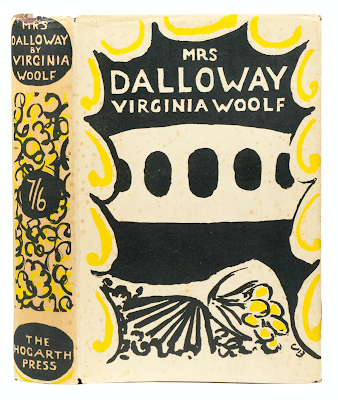The novel really has no story or plot. It’s about a party. It begins with Clarissa Dalloway going out to buy flowers for the party she’s holding in her house that evening; and ends when the party is breaking up after the VIPs have been standing around and watching each other, exchanging trivia and gossip.
Through all the meandering prose, consisting of long sentences that ramble on ruminating on everything, we hear not the narrator’s voice, but the staccato fits and starts of what’s going on in people’s minds. The longest sentence of 196 words mimics the prolixity of Proust whom Virginia Woolf (VW) greatly admired:
And everywhere, though it was still so early, there was a beating, a stirring of galloping ponies, tapping of cricket bats; Lords, Ascot, Ranelagh and all the rest of it; wrapped in the soft mesh of the grey-blue morning air, which, as the day wore on, would unwind them, …
Characters like Septimus Smith are introduced who have no connection with the main theme of people attending the party, except that his suicide by impaling himself on iron railings becomes an overheard conversation at the party – and any talk of death disturbs Clarissa. Septimus is like a patient carried around on a stretcher throughout to render a dose of medical barminess to the barmy goings on of the rich and ineffectual people in the novel.
If you consider the number of suicide cases among retuning American soldiers from tours of duty in the Middle East, it seems we are no better now at treating Post Traumatic Stress Disorder (PTSD, then called shell-shock). An analysis in 2016 indicates that an average of 20 American veterans die from suicide per day. The solution obviously lies in ending such wars, and not in spending useless billions on mental health for veterans.
What do we learn about the party-going elite from the upper crust of London society? First, we learn that they cannot hold a conversation on any serious subject. Second, that there seems no sparkle of wit in them (should we blame Virginia Woolf for that deliberate omission?). Third, that persons of average intelligence from the lower classes would have more gumption. And fourth, they are entirely devoted to the trivia of who is going up and who is coming down in their society.
A study of Clarissa, the central character in the novel will find she is a victim of her desire to hold parties that celebrate nothing – getting people together only to announce that she as a hostess has the drawing power to pull in people of substance to a perfectly dull affair. She’s also a nervous wreck who requires much cosseting, and soothing, and has never put her talents to any use. The idle rich, one might call them. In her preoccupation with minutiae, she seems to be losing her marbles as well.
The film Mrs Dalloway, screenplay by Eileen Atkins, is available on Amazon Prime and free on YouTube. It’s a marvellous film with the incomparable Vanessa Redgrave playing Clarissa, unflappable on the surface, as hostesses should be, but teeming with feelings within. Geeta remarked it’s a novel without a story. Please see this film if you can. It’s not only a beautiful rendition of the novel, but the screenwriter has managed all the disparate scenes so that they make the faithful account of a day’s journey. It all comes together to yield something tender and bruised at the end.
There is a lot of description that borders on the poetic with similes often used:
– She read on Lady Bruton's face, as if it had been a dial cut in impassive stone, the dwindling of life
– as if he had set light to a grey pellet on a plate and there had risen up a lovely tree in the brisk sea-salted air of their intimacy
– the air was in the early morning; like the flap of a wave; the kiss of a wave; chill and sharp
– she had borne about with her for years like an arrow sticking in her heart the grief, the anguish

